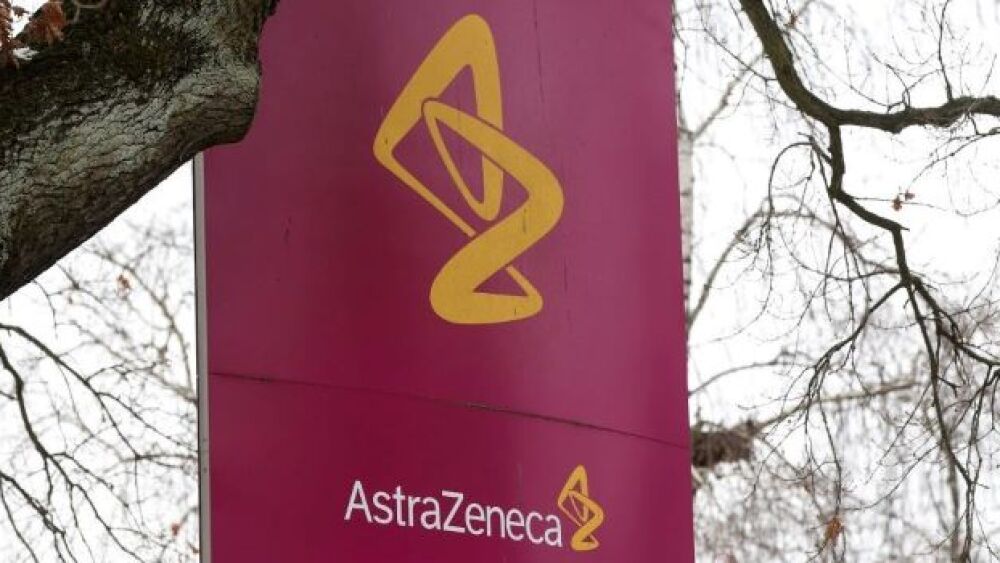Eplontersen halted ATTRv-PN disease progression and improved quality of life through 66 weeks. The drug has a PDUFA date of Dec. 22, 2023.
Pictured: AstraZeneca sign amidst winter trees/courtesy of Bodo Marks/picture alliance via Getty
With a potential $2.9 billion on the line, Ionis Pharmaceuticals and AstraZeneca announced new results from the Phase III study of eplontersen in hereditary transthyretin-mediated amyloid polyneuropathy (ATTRv-PN). The results will be presented Monday at the American Academy of Neurology (AAN) 2023 Annual Meeting in Boston.
The companies partnered in late 2021 to develop and commercialize eplontersen, a ligand-conjugated antisense medicine in development for all types of amyloid transthyretin. ATTR is a progressive and fatal disease driven by the accumulation of TTR amyloid deposits, which causes nerve damage, leading to organ failure.
In the Phase III NEURO-TTRansform study, eplontersen showed consistent and lasting benefit in the three co-primary endpoints measuring TTR concentration, neuropathy impairment and quality of life. The trial enrolled 168 patients with stage 1 or 2 ATTRv-PN for up to 66 weeks of treatment, compared to an external placebo group from a previous trial.
Eplontersen reduced TTR concentration by 82% compared to baseline, while the placebo group had an 11% reduction. Overall, 47% of patients on the investigational drug showed improvements in neuropathy and had a 5.5-point quality of life improvement on the Norfolk Quality of Life Questionnaire-Diabetic Neuropathy (Norfolk QoL-DN) scale, compared with a 14.2-point worsening in the external placebo group.
The FDA accepted a New Drug Application for eplontersen in March based on 35-week data from NEURO-TTRansform. The regulator set a PDUFA action date of Dec. 22, 2023. No advisory committee is planned or additional data requested, according to Ionis’ press release.
If eplontersen is approved, Ionis will receive up to $485 million in conditional payments from AstraZeneca. The two will co-commercialize the drug in the U.S., while AstraZeneca holds rights for the rest of the globe, excluding Latin America. Ionis can bank up to $2.9 billion in sales-related milestones plus royalties beyond that.
Eplontersen is also in Phase III trials to treat ATTR cardiomyopathy. Primary and secondary outcomes include cardiovascular mortality and recurrent clinical events and quality of life measures such as the 6-minute walk test. The trial is expected to be completed in 2025.
Fierce Competition
Ionis and AstraZeneca will have to compete with Alnylam Pharmaceuticals in the ATTR market. Alnylam’s Onpattro, approved in 2018 for ATTRv-PN, brought in $558 million in revenue for the biotech in 2022.
In February, Alnylam submitted a supplemental New Drug Application to the FDA to add ATTR-CM to Onpattro’s indications, which would expand its market reach. Onpattro is administered via intravenous infusion every three weeks.
Alnylam brought a second ATTR-PN treatment to the market in June 2022 when the FDA approved Amvuttra (vutrisiran), a subcutaneous injection dosed every three months. With limited time on the market, Amvuttra brought in $94 million for Alnylam last year. Price tags for both drugs are around $500,000 a year.
Kate Goodwin is a freelance life science writer based in Des Moines, Iowa. She can be reached at kate.goodwin@biospace.com and on LinkedIn.






